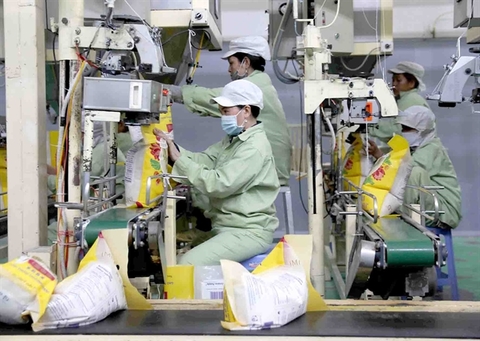
Workers package rice for export at a plant of Lôc Trời Group. The company's shares closed yesterday at VNĐ31,000 a share, a gain of over 13.5 per cent from the end of March. — VNA/VNS Photo
Rising global food prices due to the El Nino phenomenon have resulted in higher agricultural commodity prices in Việt Nam, helping lift agricultural stocks in recent months.
In the domestic market, prices of agricultural products such as rice, cassava and pork are in a bullish trend and hit peaks.
Particularly, Việt Nam’s 5 per cent broken rice was offered at US$500-510 per tonne in the last week of June, according to Reuters data. This was its highest since the week of April 1, 2021 period and compared with $495-505 a week ago.
Meanwhile, a report from the Ministry of Industry and Trade (MoIT) showed that the country’s 5 per cent broken rice was quoted at $483-487 a tonne at the end of April, an increase of $35 over the previous month, while Việt Nam’s jasmine rice for export was recorded at $553-557 per tonne, up about $10.
The price of live hog increased sharply from the beginning of the second quarter, while cassava price is also likely to continue its rallies in the near future amid high demand in China.
In the rice group, PAN shares of Pan Group surged 22.8 per cent from the end of March, while Trung An Hi-Tech Farming's TAR shares climbed by 27.8 per cent and Lộc Trời Groupi's LTG increased by more than 13.5 per cent.

Việt Nam's live log prices in three region in the first six months of 2023. The live hog prices in June were the highest this year due to the low supply. Graphic: Ly Ly Cao
KIS Securities Company said that many negative factors have reversed course, with countries such as China, Indonesia, and the Philippines increasing rice imports to compensate for their national food reserves. Việt Nam’s rice export turnover, thus, is expected to be slightly higher in the second quarter of this year.
QNS ticker symbol of Quãng Ngãi Sugar advanced nearly 28.4 per cent from the end of March. Other stocks in the sugar group also posted positive results, with Thành Thành Công - Biên Hoà’s SBT shares and Sơn La Sugar’s SLS up 20.5 per cent and 14.7 per cent, respectively.
Agriseco Research believes that the price of sugar has been in a strong uptrend for the past year, hovering around $25 per lb, up about 30 per cent over the same period.
Sugar prices may continue their uptrend and hover at high levels as the global supply of sugar is tight. The United States Department of Agriculture (USDA) forecasts that sugar stocks will fall 13 per cent in the 2022-23 crop year, mainly due to reduced production in both India and China as a result of unfavourable weather conditions.
Besides the tax policy on Thai sugar, the domestic sugar industry expects strong growth in output in the 2022-23 crop year, benefiting local businesses and sugar producers’ stocks.
In the cassava stock group, CAP of Yên Bái Forest Agricultural Products And Foodstuff Company increased 13 per cent from the end of March to VNĐ69,600 a share on Wednesday, while Quảng Ngãi Agricultural Products and Foodstuff’s APF shares rose nearly 2 per cent to VNĐ62,500 per share.
Similarly, stocks of pig farming businesses recorded better performances. HAG shares of Hoàng Anh Gia Lai jumped more than 12.8 per cent from the end of March to close Wednesday trade at VNĐ8,270 per share, and DBC ticker symbol of Dabaco Group even surged 68.5 per cent to VNĐ23,250.
The domestic live hog price may extend its recent recovery to the zone of VNĐ60,000-70,000 a kg.
This is thanks to a sharp drop in supply as many breeding households have exited the industry after suffering losses for a long time, said Agriseco Research.
Moreover, the recovery of tourism and service industries is the driving force for higher demand for pork consumption, supporting the increase in pork prices, while the complexity of African swine fever development may affect the supply in the market.
KIS Securities expects a decrease in feed supply prices will help recover pork and poultry prices. However, it noted that utility costs and interest expenses will remain high.
El Nino looms
Escalating food prices are largely influenced by concerns about complicated El Nino weather conditions this year.
Extreme weather events due to El Nino are expected to cause severe drought, threatening global food supply. This is the leading cause of rising commodity prices.
In Việt Nam, traders said that domestic rice prices increased due to scarce supply and concerns about El Nino weather phenomenon affecting production prospects.
In a recent report, Agriseco Research assessed that although it has cooled down, the commodity price level is still higher than the levels before the COVID-19 pandemic. — VNS